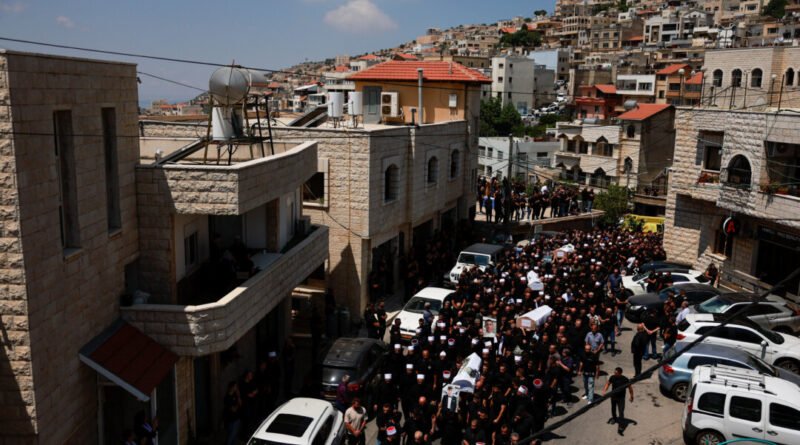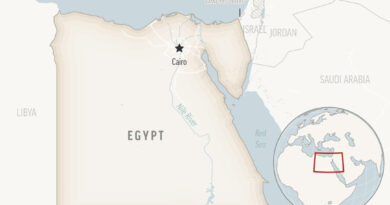Israel prepares to retaliate against Hezbollah’s strike on soccer field
Prime Minister Benjamin Netanyahu was given the authority by his cabinet late on July 28 to determine the response to Hezbollah’s attack that resulted in the death of 12 children playing soccer.
Israel’s leadership is at a military crossroads following a Hezbollah rocket attack on July 27 that claimed the lives of 12 Israeli children.
Returning from his U.S. trip on July 28, Prime Minister Benjamin Netanyahu engaged with President Biden, Vice President Kamala Harris, and former President Donald Trump. The Israeli cabinet, on the same day, authorized Netanyahu’s government to determine the “manner and timing” of a response to the rocket strike in the Israeli-occupied Golan Heights.
During the weekend, the Israel Defense Forces (IDF) reported striking seven targets in Lebanon on July 27, primarily near the border without significant escalation.
On July 29, Israel was faced with a contentious distraction. Amid growing concerns about the alleged mistreatment of Hamas prisoners at Sde Teiman base near the Gaza border, Israeli military police attempted to arrest nine reserve soldiers accused of abuse. However, they were met with resistance from protesters supporting the soldiers being apprehended.
Prime Minister Netanyahu and IDF Chief of Staff Herzi Halevi condemned the protesters’ intrusion onto the base, calling for calm amidst the chaos. However, other officials, including National Security Minister Itamar Ben Gvir, defended the soldiers under investigation.

This development poses challenges for the prime minister, who relies on far-right support for his governing coalition while facing pressure from Israel’s liberal opposition for elections.
Hezbollah Rocket Strike
On July 27, children and young adults playing on a soccer field in Majdal Shams, a Druze town in the Golan Heights, near the Syrian and Lebanese borders, fell victim to a Hezbollah rocket strike. The attack took the lives of twelve youngsters and left twenty others injured.
A mass memorial service was held at the soccer field on July 28 to honor the victims, with several children laid to rest following a communal funeral.
The territory, comprising mostly Jewish population since Israel’s occupation in 1967, did not receive international recognition despite President Trump’s acknowledgment of Israel’s annexation in 2019.
The Druze community in the Golan Heights, considered a minority group with their distinct Islamic offshoot faith, holds Israeli citizenship and enjoys full rights, actively serving in Israel’s military and police forces.
Anticipation is high for Israel’s response to the Hezbollah attacks transcending routine retaliations towards more significant actions. With airlines altering flight schedules to and from Beirut due to the ongoing tensions on July 29, several nations advised their citizens to vacate Lebanon.

During a visit to the soccer field in Majdal Shams on July 29, Prime Minister Netanyahu promised “severe” retaliation in response to the tragedy.
US Against Escalation
John Kirby, White House national security spokesman, acknowledged on July 29 that efforts would be made to prevent a broader war. Expressing sympathy for the victims and Israel’s overall situation, he asserted, “Israel has a right to defend itself. No nation should have to live with this kind of threat.”
While supporting Israel’s right to self-defense, the United States emphasized opposition to escalation, steering clear of a potential second front in the north.
The U.S. urged Israel to abstain from targeting Beirut or Lebanon’s critical infrastructures, a move many Israeli military experts believe would be part of any offensive against Hezbollah.
Despite this, Israeli Defense Minister Yoav Gallant reaffirmed to US Defense Secretary Lloyd Austin on July 29 that Hezbollah would be held accountable for the attack. Gallant highlighted the attack as a significant escalation, attributing responsibility to the Iranian proxy Hezbollah.
Identified as an Iranian-manufactured Falaq-1 rocket by the IDF, Hezbollah was singled out as the only terrorist organization with this specific type of weapon. Hezbollah claimed the rocket was intended for an Israeli military base.
The rocket’s warhead, carrying over 100 pounds of explosives, raised concerns about the nature of the attack. IDF spokesperson Rear Admiral Daniel Hagari dismissed Hezbollah’s claims, indicating the deliberate targeting of children in the strike.

While National Security Minister Ben Gvir and Finance Minister Bezalel Smotrich abstained from the vote, allowing Netanyahu and Gallant to decide on Israel’s response, the fate of Israel’s retaliation remains uncertain.
Military analyst Elliot Chodoff emphasized Israel’s need for decisive action, highlighting the limited options of escalating to war or continuing a “tit for tat” strategy that fails to address the severity of the situation.
Chodoff warned of the implications of a cosmetic response that fails to address Hezbollah’s intentions, emphasizing the need for Israel to consider its next steps carefully.
As the conflict unfolds, the United States’ cautious approach to the situation reflects its intent to prevent further escalation.
The Associated Press and Reuters contributed to this report.





